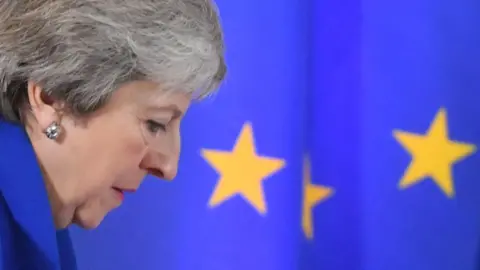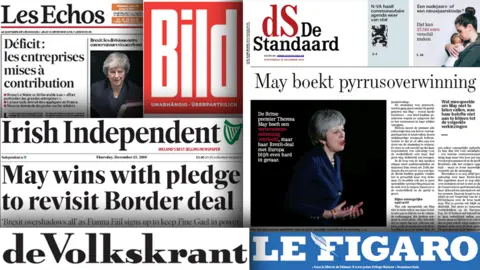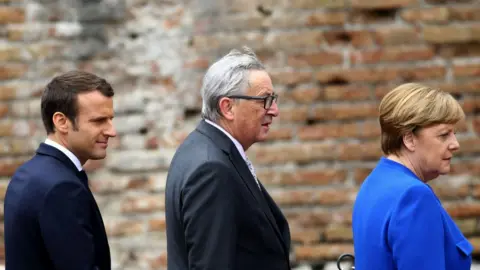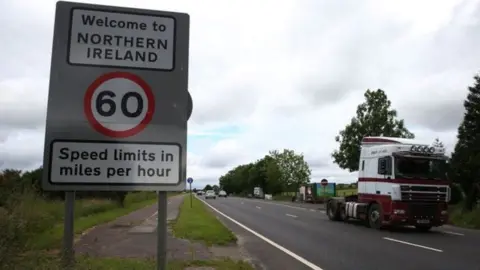Deal or no deal? EU bewildered by Brexit confusion
 Getty Images
Getty Images"Bobs" are quite the topic of discussion in the UK right now - people "bored of Brexit", desperate to read, talk and hear about something, anything, else.
But if Bobs are big in the UK, spare a thought for their numbers in the EU.
And I'm not talking men and women at European bus stops. I'm talking about EU governments.
All EU leaders - without exception - go on their winter holidays, delighted to turn their back for 10 days at least on the countless Brexit summits, phone calls and meetings.
"The British prime minister will be hard-pushed to persuade [French President] Emmanuel Macron to return to Brussels for her any time soon," one well-placed source told me.
"Brexit seems to him like a bad version of the never-ending story.
"The UK doesn't know what it wants but Mrs May keeps coming back to the EU anyway, asking for more, more and more.
"Patience is thin."
Still, despite oft-repeated insistence in Brussels that the jointly negotiated EU-UK divorce deal is not up for renegotiation, Theresa May continues to talk about winning further concessions from Brussels.
What makes her so sure?
The idea that her cabinet's much trumpeted preparations for a no-deal Brexit might worry the EU is openly mocked in Brussels as the flimsiest of paper tigers.
They simply don't buy it.
EU leaders know most UK MPs are dead-set against a no-deal scenario. They also believe that practical preparations for a cliff-edge Brexit are woefully inadequate in the UK.
In the end though, as the clock ticks down to the possibility of a no-deal that would be costly and chaotic for the EU too, Mrs May hopes European leaders will soften in the face of her demands.
There have been many predictions over Brexit but the bet in Brussels still stands - Westminster will blink first.
Not that the EU is preparing to rebuff Mrs May completely.
Leaders will offer the prime minister something in January - yet more assurances over the much-disliked Irish border guarantee, known as the backstop, if that's what she asks for.
But this will simply be a re-versioning of comforting noises the EU has made before.
The firmly held belief in Paris, Berlin and across EU capitals is that the prime minister's problems back home with the withdrawal deal are domestic ones.
 BBC Monitoring
BBC MonitoringEU leaders think they stem fundamentally from deep divisions in the UK over Brexit, which is why they haven't the slightest intention of compromising EU principles or red lines for this divorce deal.
They see no evidence the Brexit package would definitely be passed by the UK Parliament if they did.
And what of the theory the EU is playing hardball over the UK's leaving conditions in the hope it will put Britons off Brexit and encourage them to stay?
Putting aside for one moment whether that tactic could ever be successful, it's a mistake to believe at this point that all EU countries are still desperate for the UK to remain.
While that would certainly be to the EU's economic advantage - and many in German Chancellor Angela Merkel's government will have added the reversal of Brexit to their Santa wish list this year - Emmanuel Macron, for one, is not mad keen to have the UK back in the fold.
 Getty Images
Getty ImagesThe French president - in scalding hot water at home over the "gilets jaunes" or yellow-vest protesters - dreams of breathing new life into the EU.
But he already faces clear challenges with Eurosceptic governments in Hungary, Poland and Italy.
Cancelling Brexit would probably leave the UK bitterly divided politically and socially, making it - to President Macron at least - a potentially even more recalcitrant and subversive EU-insider.
Any future UK prime minister could be tempted to start the leaving process all over again - a headache Mr Macron would very much prefer to live without, which is why - should the UK decide to hold a second referendum in 2019 - Paris will be reluctant to extend the negotiating period allowed under EU law to give the UK the time to do so.
And, remember, extending this formal process - called Article 50 in EU-speak - needs the unanimous approval of all EU countries.
 Getty Images
Getty ImagesSpain too might hesitate. Madrid can see advantages in Brexit - especially when it comes to Gibraltar.
So if, against the will of Theresa May, the majority of MPs and all EU leaders, a no-deal Brexit looks likely, as no divorce agreement can finally be reached, what are the chances of a "no-deal deal" with Brussels?
This is the tantalising prospect dangled by some Brexiteers.
The argument goes that the EU will always act out of self-interest, so it will ensure that money, goods, planes, cars and trains keep moving smoothly between the UK and the rest of the EU even in the absence of a Brexit divorce agreement.
This, say some in the UK, is the ideal scenario - a Brexit mini-deal with the EU, involving no Irish-border backstop and no £39bn leaving bill as outlined in the withdrawal agreement.
 PA
PAThe first problem with this particular vision is that while it's true the EU will act in its own interest, that won't automatically benefit the UK.
Special "mini-arrangements" will be put in place by Brussels in the case of a no-divorce-deal Brexit - but they will be limited to a matter of months and, according to the EU, will come to an end without negotiation with the UK.
The logic behind such temporary measures would be to protect EU citizens and businesses from the most disruptive consequences of the UK crashing out of the European Union.
Equally important to consider: the transition period after Brexit - where the UK legally leaves but remains a member in practical terms - is entirely contingent on the UK accepting the withdrawal deal.
It's hugely unlikely that Brussels would allow the UK to "pay for" a transition period in the case of a no-deal Brexit, as some MPs have suggested.
EU leaders go in to 2019 bewildered by the maelstrom of contradiction and confusion in UK politics - and beyond frustrated by the Brexit process.
But they also remain ultimately confident that, if and when the UK does leave, their men and women in Brussels will retain the upper hand in the negotiations that follow on future EU-UK trade and security relations.
Once the UK has left the EU, it will no longer be regarded as a former member but rather as an outsider and potential rival.
The EU is used to dictating terms and imposing regulations on wannabe trade partners, thanks to its economic muscle and the size of its internal market.
Brussels likes to strut on the world trade stage. It has no intention of allowing Brexit to ruin the show.

